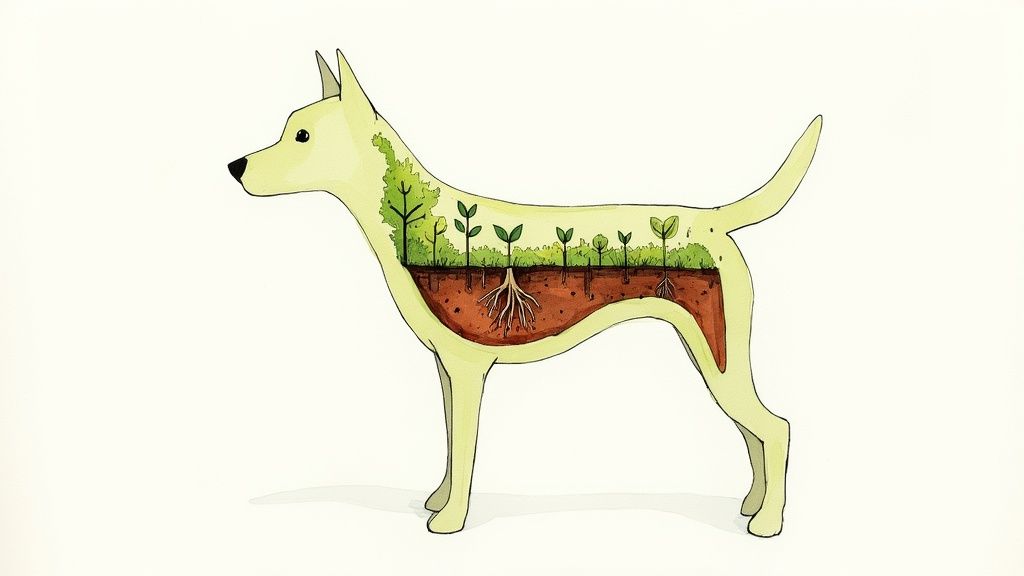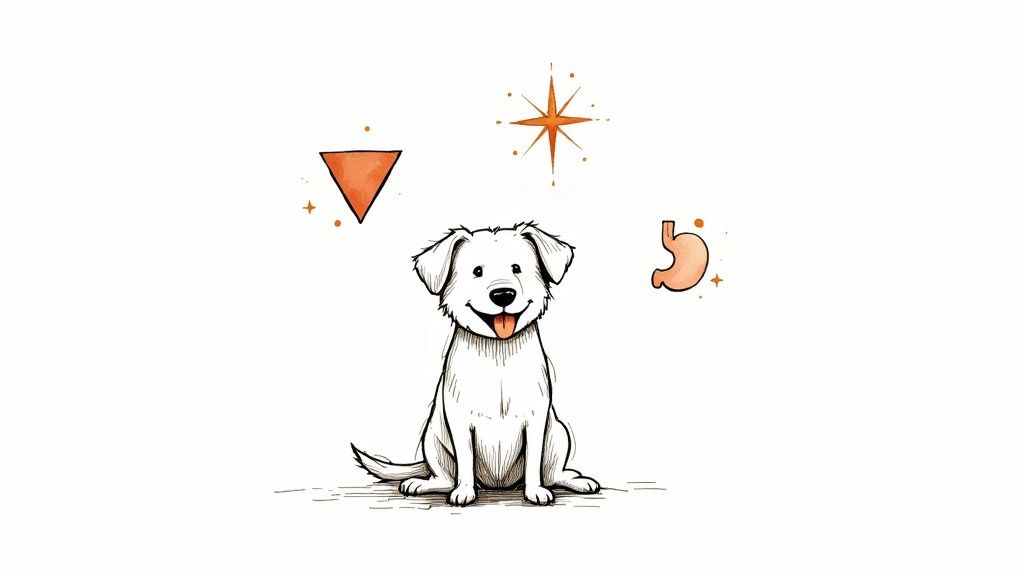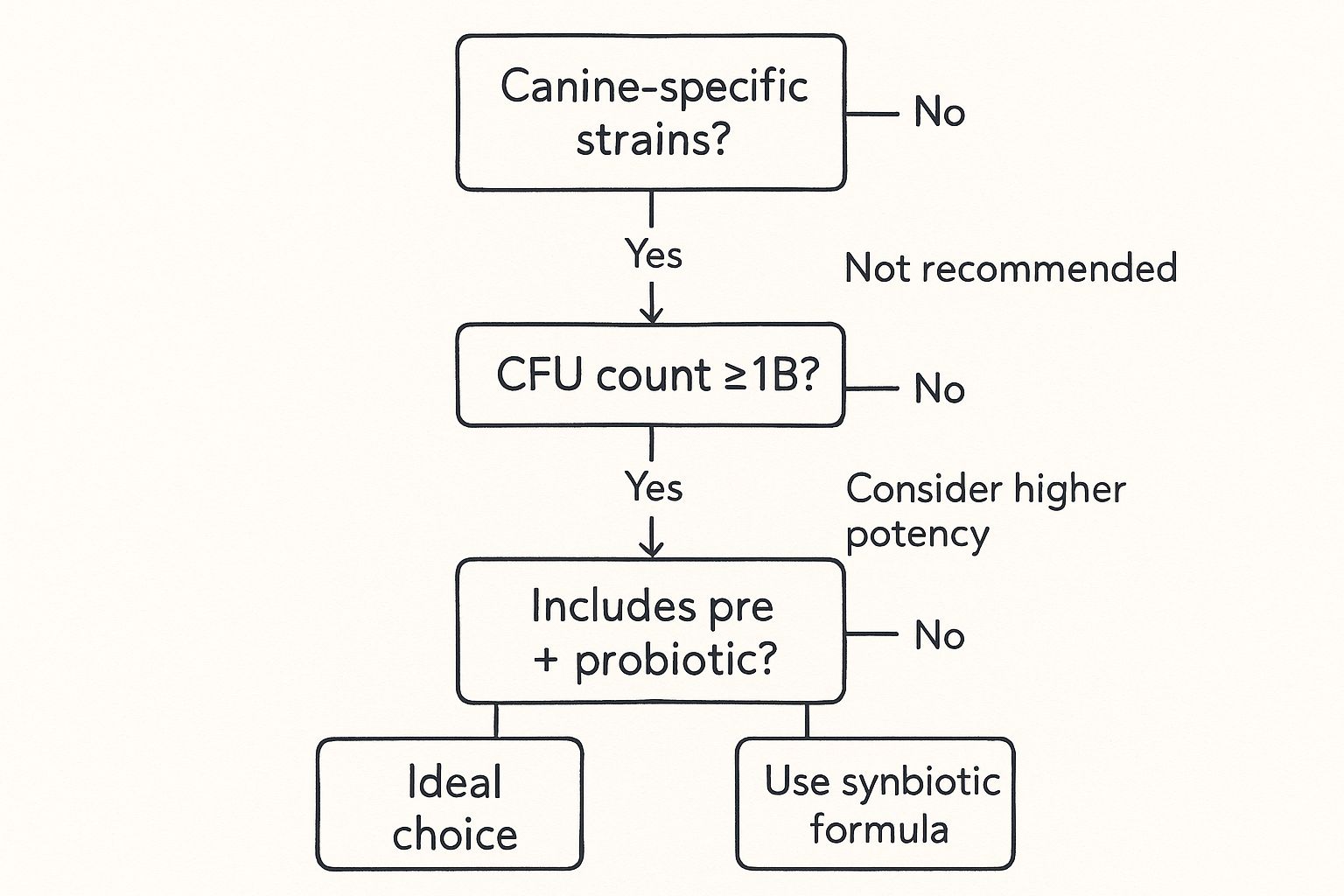Prebiotics and probiotics work together as a powerful team to support your dog's digestive system. Think of it this way: probiotics introduce the 'good guys'—beneficial bacteria—while prebiotics provide the specific food they need to thrive. This combination is key to maintaining a balanced internal ecosystem, which underpins their overall health and vitality.
Your Dog’s Gut Health: The Secret to Their Vitality

The foundation of your dog's well-being isn't just about walks and cuddles—it's hidden deep within their gut. It helps to imagine your dog’s digestive system as a vibrant, complex garden. When this internal ecosystem is flourishing, it impacts everything from their energy levels to their immune defences and even their mood.
This delicate internal world is known as the gut microbiome, a bustling community of trillions of microorganisms. For your dog to be at their best, a harmonious balance between the good and bad bacteria is absolutely essential.
Why Gut Balance Matters
An imbalance in this microbial colony, often triggered by stress, a sudden diet change, or medication like antibiotics, can lead to noticeable issues. In fact, many common digestive problems in dogs can be traced directly back to a disrupted gut. A well-maintained gut does far more than just digest food; it’s estimated that a staggering 80-90% of the immune system is located in the gut lining.
When a dog's gut is healthy, you'll often see the benefits firsthand:
- Improved Digestion: Less gas, bloating, and general discomfort.
- Better Stool Quality: Stools become more consistent, firmer, and easier to manage.
- Enhanced Nutrient Absorption: They get the maximum goodness out of every meal.
- Stronger Immunity: A robust first line of defence against illness.
Introducing the Gardeners of the Gut
This is where prebiotics and probiotics for dogs come into play. They are the heroes working to tend this internal garden.
Probiotics are the beneficial ‘plants’ or good bacteria that help keep everything in balance. Prebiotics act as the specialised ‘fertiliser’, providing the essential food these good bacteria need to grow strong and multiply.
By nurturing this internal garden, you’re taking one of the most powerful steps toward ensuring your companion leads a healthier, happier life. Understanding this synergy is the first step in unlocking your dog's full potential for vitality.
What Are Probiotics? The Good Bacteria Your Dog Needs

Let’s get to know the ‘good guys’ living in your dog’s gut. Probiotics are live, beneficial bacteria that work as the frontline defenders in your dog's digestive system. Think of them as essential workers keeping things in balance, pushing out harmful pathogens, and giving the immune system a direct boost.
A great way to picture it is to imagine probiotics as tiny security guards for your dog’s intestines. When there are enough of them on duty, they form a protective shield along the gut lining. This makes it much tougher for unwelcome bacteria to gain a foothold and start causing trouble. It’s not just about aiding digestion; it's a very active form of defence.
This protective role is something more and more pet parents are cottoning on to. Here in the UK, the demand for pre & probiotics for dogs is really taking off. While the global market is growing steadily, the UK is set to expand at a striking CAGR of 7.5% between 2025 and 2035. Dogs make up a huge 65% of that slice, which shows just how much we’re focusing on proactive gut health. You can read more about these trends on Future Market Insights.
The Key Players in Your Dog's Gut
Not all probiotics are the same, and different strains offer unique benefits specifically suited to a dog’s body. For a probiotic to do its job, it has to be tough enough to survive the harsh, acidic journey through the stomach and make it to the intestines, where it can finally set up camp.
Two of the most well-studied and effective groups of probiotics for dogs are:
- Lactobacillus strains: You’ll often find these in fermented foods. They are brilliant at producing lactic acid, which helps stop less friendly bacteria from growing. They're a fantastic choice for general digestive support and keeping the gut environment healthy.
- Bifidobacterium strains: These microbes are particularly good at supporting the immune system. They mostly live in the colon and are known for helping with stool quality and overall gut comfort.
By introducing these specific, canine-friendly strains, you aren’t just adding bacteria—you're reinforcing your dog’s natural defence systems from the inside out.
How Probiotics Actively Work
Probiotics do more than just hang around in the gut. They actively compete with harmful bacteria for both territory and food, essentially starving them out. This process, known as competitive exclusion, is crucial for preventing bad bacteria from taking over.
They also produce incredibly useful compounds, like short-chain fatty acids (SCFAs). These substances not only provide energy for the cells lining the colon but also strengthen the gut barrier and have anti-inflammatory effects, contributing to your dog’s all-around health and happiness.
Here’s the rewritten section, designed to sound like an experienced human expert and flow naturally.
Why Prebiotics Are the Unsung Heroes of Gut Health
If you think of probiotics as the good guys—the beneficial bacteria setting up camp in your dog's gut—then prebiotics are their personal catering service. It’s a simple but powerful concept: probiotics add helpful bacteria, while prebiotics feed the good bacteria that are already there, helping them thrive.
This teamwork is what really creates a healthy gut environment for the long haul.
So, what exactly are they? Prebiotics are specific types of fibre found in certain plants. Your dog can't digest them in the usual way, so they travel all the way down to the colon untouched. Once they arrive, they become the perfect meal for beneficial gut microbes like Lactobacillus and Bifidobacterium.
This is where the magic happens. By selectively feeding only the good bacteria, prebiotics help them multiply and crowd out the harmful ones. It’s like tending a garden—you’re providing the exact fertiliser the good plants need to flourish, which naturally leaves less room for weeds to grow. This simple act helps tip the scales in favour of a balanced, happy gut.
The Most Common Prebiotics on the Label
When you start looking at supplements, you'll see a few names pop up again and again. These are the tried-and-tested prebiotics that form the backbone of any good gut health formula. Knowing what they are and what they do can help you choose the best product for your dog.
Here are two of the most effective and well-researched prebiotics you’ll find:
- Fructo-oligosaccharides (FOS): This is a real powerhouse, often extracted from plants like chicory root. FOS is particularly good at encouraging the growth of Bifidobacteria, which are crucial for keeping the gut lining strong and supporting a robust immune system.
- Mannan-oligosaccharides (MOS): Usually sourced from yeast cell walls, MOS is clever stuff. It doesn’t just feed the good bacteria; it also has a unique ability to latch onto harmful pathogens, preventing them from sticking to the gut wall and helping to escort them out of the body.
It's the partnership between prebiotics and probiotics that truly unlocks lasting gut health. Giving one without the other is like having a car with no fuel. When they're combined, it’s called a synbiotic—a formula designed to create the ideal conditions for digestion and immunity to thrive.
By making sure your dog’s supplement contains both, you’re not just providing a quick fix. You're building a resilient, self-sufficient ecosystem inside their gut. It’s a smarter, more sustainable approach to supporting their overall health from the inside out.
What Prebiotics and Probiotics Can Really Do for Your Dog

The science is interesting, but what really matters is seeing your dog thrive. When you give their gut the right support with pre & probiotics for dogs, the benefits start to show in their everyday life. These aren't just abstract concepts; they lead to real, tangible changes you can actually see.
A balanced gut is the foundation of a happy, healthy dog. The first and most obvious improvements you’ll likely notice are digestive. Many owners tell us they see a huge drop in common problems like embarrassing gas, uncomfortable bloating, and those unpredictable tummy upsets.
This move towards digestive peace is often clearest in their toilet habits. One of the best signs of a healthy gut is consistently firm, well-formed poos that are easy to pick up. It’s a simple sign that your dog's system is firing on all cylinders, breaking down their food and soaking up all the good stuff. For more tips, you can explore these helpful remedies for a dog's upset stomach.
More Than Just a Happy Tummy
The perks of a balanced gut reach far beyond digestion. It’s a surprising fact, but some estimates suggest up to 90% of a dog's immune system is located right in their gut. So, when you support their gut, you’re helping to build a stronger, more resilient dog.
A healthy community of gut bacteria helps keep the immune response in check, and this can have a wonderful ripple effect on your dog’s overall health.
This powerful gut-health connection is why many pet parents notice improvements in areas they weren't even thinking about:
- Fewer Allergy Flare-Ups: A well-balanced immune system is less likely to overreact to things like pollen and dust, which can mean calmer skin and a lot less scratching.
- A Beautiful Coat and Skin: When your dog can properly absorb all the nutrients from their food, it often shows on the outside with a glossier coat and healthier skin.
- Better Nutrient Uptake: Probiotics help produce enzymes that assist in breaking down food, making sure your dog gets every last bit of nutritional value from their meals.
A Growing Focus on Gut Health
This isn't just another fad in the pet world; it’s a shift based on a much deeper understanding of what keeps our dogs well. Across the UK, the demand for quality probiotics designed specifically for dogs is growing fast.
The European animal probiotics market is already worth over USD 1.2 billion. With so many of us owning pets, the UK is a big part of this trend as we look for vet-approved ways to support everything from digestion to immunity. If you're interested in the market trends, you can read more at Cognitive Market Research.
By looking after your dog's gut, you're doing more than just managing symptoms. You're supporting their core health from the inside out, helping them build stronger defences and live a more vibrant life.
How to Choose the Right Supplement for Your Dog
Walking down the pet aisle can feel pretty overwhelming, can't it? With so many pre & probiotics for dogs lining the shelves, it’s tough to know which one to trust. To make a confident choice and see real results for your dog's gut health, you need to know exactly what to look for on the label.
Canine-Specific Strains are a Must
First things first, check for canine-specific strains. A dog's gut is a world away from our own, especially with its highly acidic environment. Probiotics made for people simply won't survive the journey to your dog's intestines, rendering them useless.
You want to see names like Enterococcus faecium or specific dog-friendly Lactobacillus and Bifidobacterium species on the ingredients list. These are the strains proven to set up camp and get to work where your dog needs them most.
Check the Potency (CFU Count)
Next up is potency, which you'll see measured in Colony Forming Units (CFUs). This number isn't just jargon; it tells you how many live, active bacteria are packed into each dose.
For day-to-day gut maintenance, a daily dose of at least 1–5 billion CFUs is a solid starting point. Dogs with more persistent digestive troubles might need a higher count. Crucially, look for products that guarantee this count at the time of expiry, not just on the day it was made. That's a sign of a quality supplement.
Why a Synbiotic Formula is Best
To get the most bang for your buck, always aim for a supplement that contains both prebiotics and probiotics. This powerful duo is what’s known as a synbiotic.
Think of it this way: prebiotics are the packed lunch for the probiotics. Including them in the formula ensures the good bacteria you're introducing have the fuel they need to thrive and colonise the gut. Common prebiotics to look out for are FOS (fructo-oligosaccharides) and MOS (mannan-oligosaccharides).
A synbiotic formula is the gold standard for gut support. It doesn't just add good bacteria; it creates a sustainable environment where they can flourish, offering a much more complete approach to digestive wellness.
This infographic breaks down the key decision points for picking a high-quality supplement.

As the visual guide shows, the ideal supplement will always feature dog-specific strains, a guaranteed CFU count, and that all-important synbiotic blend for maximum impact.
To make this even clearer, here's a simple table to help you evaluate your options when you're shopping.
Key Factors for Choosing a Canine Probiotic Supplement
| Feature | What to Look For | Why It Matters |
|---|---|---|
| Bacterial Strains | Multiple canine-specific strains (Lactobacillus, Bifidobacterium, Enterococcus faecium) | A dog's gut environment is unique. Human-grade strains often won't survive and will be ineffective. |
| CFU Count (Potency) | 1–5 billion CFUs (or more for specific issues) guaranteed at expiry | This ensures enough live bacteria reach the gut to have a beneficial effect throughout the product's shelf life. |
| Synbiotic Formula | Includes both probiotics (live bacteria) and prebiotics (FOS, MOS, inulin) | Prebiotics feed the probiotics, helping them to colonise and thrive, which makes the supplement far more effective. |
| Formulation | Powders, chews, or liquids that suit your dog's preferences | The best supplement is the one your dog will actually take. Choose a format that fits easily into your daily routine. |
| Brand Reputation | Positive reviews, transparent sourcing, and veterinary-backed formulations | A reputable manufacturer is more likely to follow quality control standards, ensuring the product is both safe and effective. |
By keeping these points in mind, you can confidently sort the great products from the mediocre ones.
Finding the Right Format for Your Dog
Supplements come in all shapes and sizes, and the best one often just comes down to what works for you and your dog.
- Powders: These are brilliant for mixing straight into your dog's food and make it easy to adjust the dosage.
- Chews: Often flavoured like a treat, chews are a fantastic and convenient option, especially if you have a fussy eater on your hands. We have some great suggestions in our guide to probiotic dog treats.
- Liquids: This format can be incredibly simple to add to food or water, but always double-check the storage instructions to keep it potent.
The demand for these products isn't just a fleeting trend. In the UK, probiotics now make up a huge 29% of the entire pet dietary supplement market, which is valued at around USD 224.8 million. Experts predict this sector will grow by a healthy 9% each year, all thanks to devoted owners like you seeking the best for their companions. You can read more about these UK market insights on Future Market Insights.
By focusing on these key details, you can cut through the marketing noise and choose a product that will truly support your dog from the inside out.
Your Top Questions About Pre & Probiotics for Dogs
It's completely normal to have questions when you're thinking about adding a new supplement to your dog's routine. After all, you want to do what's best for them. Let's walk through some of the most common queries we hear about pre & probiotics for dogs, so you can feel confident you're making the right call for your furry friend.
Can My Dog Just Take My Human Probiotics?
It’s a tempting thought, especially if you have a bottle right there in the cupboard. But while your own probiotics aren't toxic to your dog, they’re not likely to do much good, either. The simple reason is that a dog's gut is a world away from our own.
Think about it: their digestive tract is far more acidic, and the types of bacteria that thrive there are completely different. Canine-specific formulas are built for this tough environment. They use resilient, dog-friendly strains like Enterococcus faecium, which have been proven to survive the acidic journey through the stomach and actually set up shop in the intestines. A human product just isn't designed for that, so most of the good bacteria will be destroyed long before they can help. For safety and real results, always choose a probiotic made specifically for dogs.
How Do I Know If My Dog Needs Probiotics?
Sometimes, the signs are loud and clear. If your dog is plagued by frequent diarrhoea, embarrassing gas, bloating, or constipation, their gut microbiome is probably sending out an S.O.S.
But gut health issues don't always stay in the gut. An imbalanced microbiome can cause problems that show up in surprising ways. You might want to look closer if you notice:
- Pesky skin problems or a coat that's lost its shine.
- Persistent bad breath (and you've already ruled out teeth issues).
- Ear infections that keep coming back.
- Signs of stress after a trip, a stay at the kennels, or even a small change at home.
Also, a big one to remember is antibiotics. If your dog has just finished a course of medication, probiotics are a must. Antibiotics are great at killing off bad bacteria, but they take the good guys down with them. Replenishing that friendly flora is essential for getting their gut back on track.
Think of it like this: antibiotics are a wildfire that clears the forest floor. Probiotics are the new seeds you plant afterwards, helping a healthy, diverse ecosystem grow back stronger than before.
How Long Until I See a Difference?
With any supplement, a little patience and consistency go a long way. How quickly you see results from pre & probiotics for dogs really depends on your dog and why you’re using them in the first place.
For a sudden tummy upset, like a bout of stress-related diarrhoea, you could see an improvement in just a couple of days as the good bacteria get to work calming things down. But for longer-term issues like skin allergies or boosting overall immunity, you'll need to give it more time. It generally takes about four to six weeks of daily use to see a real, lasting change. Remember, you’re helping to gradually rebuild an entire ecosystem, and that process can't be rushed.
Are There Any Side Effects I Should Worry About?
For the vast majority of dogs, probiotics are incredibly safe, and serious side effects are almost unheard of. What you might see is a short "settling in" period when you first start.
As your dog's gut microbiome begins to change for the better, you might notice a little extra gas or a slight change in their poo for the first few days. This is perfectly normal and actually a good sign that the probiotics are starting to work their magic. To make the transition smoother, you can start with half the recommended dose for a few days before working up to the full amount. If any tummy trouble seems to get worse or doesn't clear up, it's always best to stop and have a chat with your vet.
Here at Tipaw, our mission is to help your dog feel their best from the inside out. Our vet-approved, 100% natural supplements are crafted to deliver results you can see and trust. Explore our range of functional chews and give your dog the gift of a happy, healthy gut by visiting us at https://www.store-tipaw.com.





